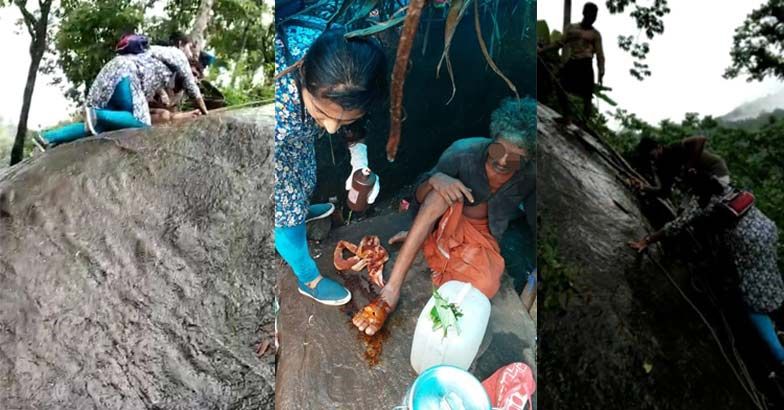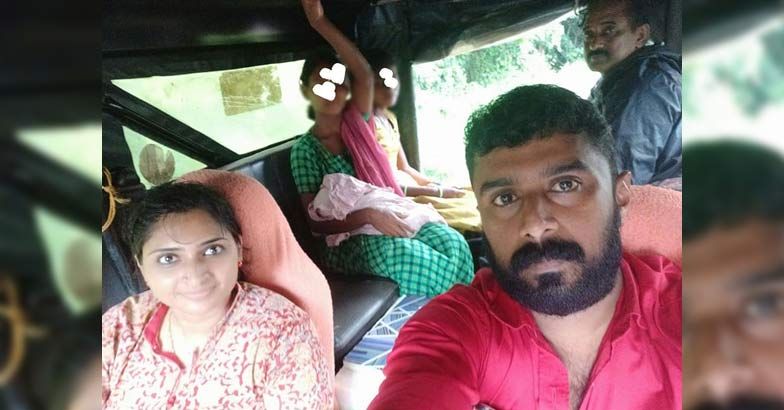Lady Doctor treks to the deep forest to save a tribal man

To be successful in any field, you need to be passionate towards the job you do. It is the passion that provides you with the will to undertake any risk. And if there is a will, you’ll find a way to achieve it. The story of Dr. Ashwathi Soman, a young physician from Manjeri, who became an internet sensation overnight, through her 10-km trek through the dense forest to reach out to her patient in a tribal colony, is a perfect example for showing how passion can drive a person to fulfill their professional responsibilities by beating all the odds.
When passion defeated Risk

Dr. Aswathi was working as a medical officer at Kottappuram in Palakkad district in Kerala when she first heard about Malappuram’s tribal stretch. She decided to join the mobile dispensary team when she learned about the hilly tribal villages in the remote areas unreachable by modern facilities. She requested for the transfer knowing that women doctors are hardly deputed in such areas. But to her surprise, she received her transfer letter to Nilambur as the head of nodal medical officers. From her home in Manjeri to her workplace in Nilambur, she travels over 130 km a day. The official record keeps the exact data of the tribal population living in the forest. The forest officers and native watchers keep the officials updated about the health conditions of the tribal people. The mobile dispensary team in Nilambur can reach out almost all the colonies except the except the highest settlement of a primitive tribal clan called Chola Naykar. This specific colony is 50km deep in the forest and the people of this tribe are hesitant to interact with the mainstream since they choose natural healing.
On June 18th Nilambur’s nodal medical officers got an update on a middle-aged Chola Naykan Ravi, suffering from a bleeding wound on the right leg. Dr. Ashwathi reached out to forest officials in the region to inquire about accessing the tribal settlement and found that the only way to reach Ravi was to travel all the way to the settlement while being equipped with enough medical paraphernalia to perform a surgery. As soon as they heard it, a ten-member team including two nursing staff from the Malappuram taluk hospital and a couple of forest officers and safety officials set out to Panappuzha ooru, where the tribals live. “We were accompanied by tribal watchers. We traveled half the way in a car and some of the rest by a jeep. About 10 km from our destination, we saw some huge trees blocking our path. We decided to trek the remaining distance. The natives used axes and ropes to remove huge logs from our way. We had to climb rocks, slippery slopes and steep hillsides to reach the settlement,” explained Ashwathi to Manorama, a Malayalam daily.
By the time the team reached the village, Ravi had lost quite a lot of blood. Since the wound had developed an infection, the only way to save him was by amputating his infected toe. He had a diabetic history which restricted the team to conduct an on the spot surgery. Dr. Aswathy says that keeping his blood flow under control was easy, but persuading him to come down at the hospital was the hardest part. She had to warn Ravi of the dire consequences that would befall him if his foot didn’t receive immediate medical attention. “I told him he would lose his toe today, a leg tomorrow and life the day after. Luckily, that scared him, and he got ready to accompany us downhill,” she added. By making him understand, the team took him to the hospital and amputated his toe. He is currently recovering in the Malappuram Taluk Hospital.
What do they need?
Dr. Ashwathi insists that the government should do what the tribes need instead of trying to bring them to the mainstream. She also opines that the tribes don’t need a drastic change, instead, they need access to all modern amenities which can make their life better.
Dr. Ashwathi will be heading the four nodal medical offices of Nilambur for three years. After that period too, she wishes to serve remote villages and people. Despite living a hectic life as a doctor, she also finds time to explore her interested realms like cinema, advertising, television anchoring, and literature. When asked about the decision to serve in remote areas, she told Manorama, “There is only one life and you should live it in a place which needs you!